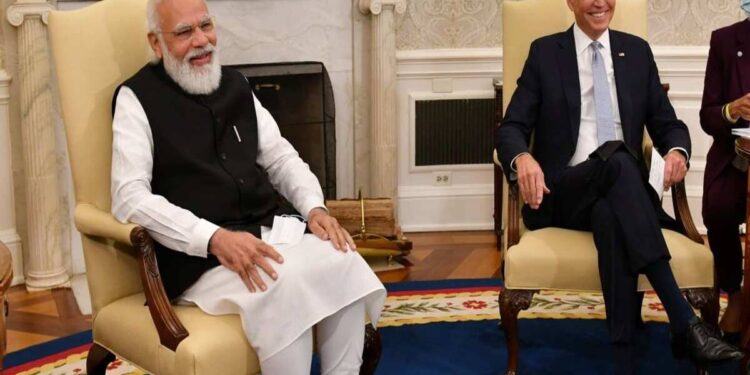 The US President Biden is hosting the first of the two Summits for Democracy on Dec 9-10.
The US President Biden is hosting the first of the two Summits for Democracy on Dec 9-10.Prime Minister Narendra Modi will be attending the two day “Summit for Democracy” which has been convened by the US President Joe Biden.
He is expected to deliver his address virtually on Friday (Dec 10, 2021).
“The present summit aims at two key objectives: defend and organise democracies of the world, and halt the spread of authoritarianism especially from China and Russia,” Prof Rajan Kumar, School of International Studies, JNU, tells Financial Express Online.
Adding, “The American establishment views Biden’s “Summit for Democracy” as a significant initiative to promote democratic norms across the globe. Promotion of democracy has been one of the key organising principles of American foreign policy in the last seven decades.”
More about the summit
The US President Biden is hosting the first of the two Summits for Democracy on Dec 9-10.
Leaders from government, civil society, and the private sector are expected to be present at the Summit and this will help in setting forth an affirmative agenda for democratic renewal. According to the US Department of State, collective action will help tackle the threats faced by democracies.
This will also give a chance to all attendees to learn, listen and engage with a diverse range of actors.
Expert View
Sharing his views on the summit, Prof Rajan Kumar, School of International Studies, JNU says, “On the surface, it appears to be a significant idea and a powerful initiative, but if we dig a little deeper, contradictions galore and expectations are very low from this summit in terms of deliverables. First and foremost is the crisis of credibility. When the liberal institutions are crumbling all over the world, especially in America, this summit is unlikely to restore the confidence of people. Liberal democracies have uplifted a small section of the people in the world, and a large section of people are feeling left out and cheated. Inequality has grown and there has been no increase in the real income of the blue collar workers in the last three decades. They have become the targets and sympathisers of majoritarian populism. The damage done by the Trump administration to American democracy cannot be undone by preaching the world leaders virtues of democracy.”
Second, “Many would argue that this is an exercise to re-establish the hegemony of America that has been eroding in the last few years. In selecting countries to be invited, many were excluded, but some with very low credentials were invited. The determining factors were American strategic interests rather than its real commitment to norms of democracy. Exclusion of Hungary and Turkey, and inclusion of Pakistan, Congo, Philippines and Ukraine make no sense but for strategic reasons,” Prof Rajan opines.
Third, “promoting democracy has always been a controversial exercise and it has not necessarily succeeded in the past. We have umpteen number of instances in which “colour revolutions” and “regime change” exercises of the West have led to more conflicts and bloodshed. Georgia, Ukraine, Syria, Iraq, Libya, and Egypt are testimonies to the fact that imposing democracies from above do not succeed,” he adds.
Fourth, “China and Russia are strongly opposed to the exercise of promoting democracy.They contend that the West uses human rights and democracy to pursue its own vested strategic interests. China’s ambassador to the United States, Qin Gang, and his Russian counterpart, Anatoly Antonov, co-authored an article recently in which they denounced this summit as hypocritical and hegemonic. These two countries promote the concept of “sovereign democracy” which essentially implies: every state is sovereign and external intervention in the name of democracy cannot be tolerated.”
President Xi Jinping said in a meeting of the Communist Party, “Democracy is not an ornament to be used for decoration; it is to be used to solve the problems that the people want to solve.”
According to Prof Rajan, “such ideas are very popular in China, Eurasia and a large part of Asia and Africa. China projects itself as the ideal model of economic growth for the developing countries. How do democracies counter this narrative remains an important challenge?”
The question is can the summit galvanize people and institutions which have witnessed reversal with the rise of majoritarianism, populism and even authoritarianism? “While I support the idea of a democratic coalition, I have serious doubts about the outcomes of this summit,” he adds.
Get live Stock Prices from BSE, NSE, US Market and latest NAV, portfolio of Mutual Funds, Check out latest IPO News, Best Performing IPOs, calculate your tax by Income Tax Calculator, know market’s Top Gainers, Top Losers & Best Equity Funds. Like us on Facebook and follow us on Twitter.
![]() Financial Express is now on Telegram. Click here to join our channel and stay updated with the latest Biz news and updates.
Financial Express is now on Telegram. Click here to join our channel and stay updated with the latest Biz news and updates.














